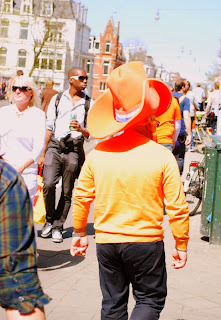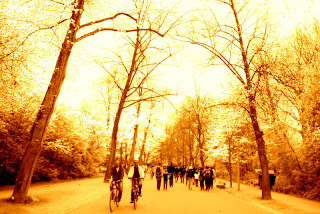George Orwell’s 1945 classic Animal Farm, which Grote Jongen is reading albeit under extreme duress, is apparently "an allegory for the Russian Revolution".
"Really?" I ask, desperately and unsuccessfully trying to remember my relevant high school English class. "Not a lesson in animal husbandry then?"
This leads to eye rolling, tongue clicking and deep sighing from Grote Jongen, and stifled giggles from Ned Nederlander, who for professional reasons is quite fond of an agricultural joke.
"What exactly is an allegory?" I inquire. (I'm pretty sure I know the answer, or could at least bluff my way through a sentence using the word, but I'd just like to check).
Apparently my budding literary genius is engrossed in his homework - a clear case of studiousness of convenience - and my question goes unanswered.
My own recent reading material encourages me to (at least attempt to) demonstrate genuine interest in subjects raised by adolecent boys. I am far more confident discussing English literature and world history with him than I am with our more usual topics of social networking, killing techniques used in Call of Duty, or the cruel inadequacy of his weekly allowance. So I persevere. "What exactly happened in the Russian Revolution?" I coax, ever hopeful that I might elicit more than a two grunt reply. Even as the question lands with a thud between us, I am aware that when I was twelve I probably had never even heard of Russia, much less her Revolution.
"It's a revolution that they had in Russia". Delivered deadpan, without a trace of irony or as much as a sly smirk. And so he unknowingly sows the first seeds of doubt about the value of the international education we are providing for him.
With the discussion obviously closed, I leave the room and surreptitiously thumb through my dictionary (just to double check, you understand). I find "allegory", nestled between "allege" and "alleluia", which seems apt somehow, since I had "asserted without proof" that I knew what it meant, and I had mouthed a "song of praise" on discovering that I had been close enough to knowing its meaning after all.
I then return to my computer and, checking that Grote Jongen can't see my screen, type "Animal Farm allegory" into my preferred search engine.
Utilising research skills garnered during the course of two university degrees and a twenty year career advising clients on things I had little real knowledge of, I spent a good five minutes bringing myself up to speed on the underlying message of George Orwell's classic. At this point, I should really apologise to Mr Lloyd for not paying more attention in my English class circa 1978, because it seems that Animal Farm is actually quite a fascinating read, possibly wasted on surly adolescents.
In fact, my extensive research, combined with some frightening recent personal experience, has revealed that Animal Farm is in fact an allegory for the life of certain adolescent boys. Consider the following key themes of the book, and the alleged parallels with Grote Jongen's terribly unfortunate life on The Low Down Farm:
The use of rules and traditions to maintain order on the farm.
Grote Jongen's parents (a clear parallel with Orwell's pigs) impose a highly unreasonable set of rules and family traditions, including requiring him to be in bed by 9:00pm on a school night, eating occasional dinners together as a family and conversing pleasantly with fellow diners throughout those meals.
Tyranny as a management style, with associated manipulation through oppression
Apparently parental payment for a mere 100 texts a month is evidence of a cruel and oppressive regime. Compare this with a close friend of Grote Jongen, who goes by the name of "Everyone", and who never suffers the indignity of parental oppression. Everyone's parents happily pay for unlimited texts, phone calls and data downloads, and furthermore Everyone has a Blackberry or an iPhone. Everyone is also allowed to go to bed whenever he wants, and his parents give him money whenever he asks for it.
Leadership and corruption
Forcing adolescents to participate in family outings when they would obviously prefer to stay home on The Low Down Farm and interact with friends through social networking, or watch football matches on television, is clear evidence of cruel corruption among the leadership. Using the privileged position of parent as a basis for imposing boundaries and conditions is apparently an unacceptable abuse of power. Orwell had a similar message for his readers.
Foolishness and folly
The less said the better, although I must make passing mention of the idea that refusing to complete school assignments on the grounds that they are "stupid and boring", as someone on this farm has done recently, sounds suspiciously like something that Mollie the sheep might have come up with in Animal Farm.
The use of violence or the threat of violence as a tool for political oppression
This is used to great effect by Grote Jongen against Kleine Jongen.
Pride in banding together to overthrow an oppressive leader
Despite the example given above, De Jongens regularly demonstrate great camaraderie in the face of their oppressive leaders, employing a unified front of frightening efficiency and effectiveness that Orwell's sheep could only have dreamed of. For example, "No Dad, you definitely said we could stay up until 11:30pm tonight to watch the game on TV. We both heard you".
Lies and deceit
Orwell's pigs convince the other animals that their current situation is better than they think. The pigs give the other animals hope for the future by assuring them that all their dreams will come true. In an uncanny parallel, Grote Jongen's parents refuse to accept his claims of poverty and hardship, pointing out that he is very fortunate to live where he does, on the farm that he lives on. They secretly hope that repetition of this mantra will lead to eventual acceptance of it.
Gaining power by controlling the intellectually inferior
In Animal Farm, Orwell's sheep are portrayed as intellectually inferior to the other animals, and the pigs take advantage of that ignorance to manipulate them. On The Low Down farm however, there is an ongoing debate about which characters are the most intellectually inferior; Grote Jongen generally believes that honour goes to his parents who apparently "don't know anything, but think they know everything". Strangely, the more the leadership struggles against the rebellion, both in Animal Farm and on The Low Down Farm, the more their self-doubt grows and the closer they come to believing that they are indeed intellectually inferior to the masses they are trying to manage.
So, at least now I am pretty sure I have a firm grip on the meaning of "allegory". Pleasingly, from my perspective, and I'm sure from Mr Lloyd's as well, I also have a much firmer grip on the subtext of Animal Farm than I did in 1978.
I am less sure about the strength of my grip on the next few years of motherhood, but with the help of the classics I think I can get through it. For starters I just need to remember that on the Low Down Farm, "all animals are equal but some animals are more equal than others".
Signed
The Dutchess
















